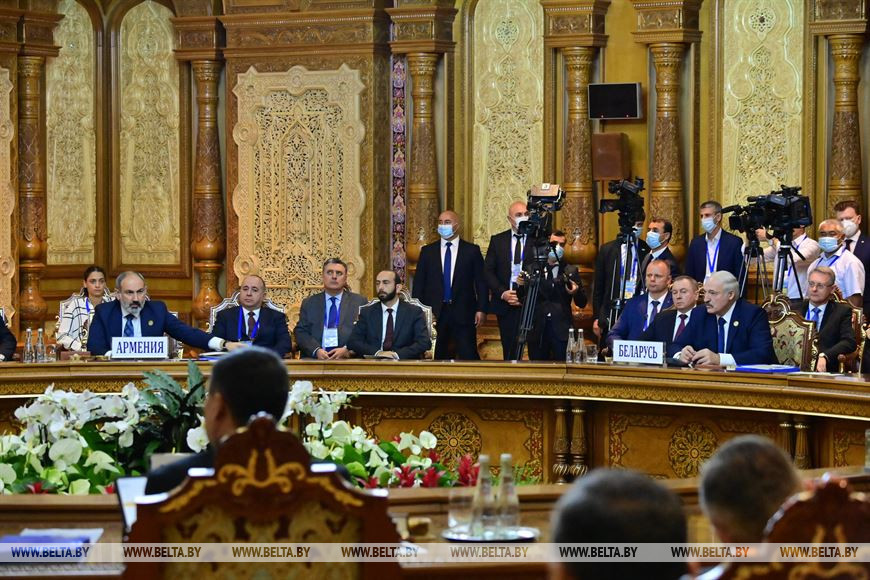Overlapping with Collective Security Treaty Organization (CSTO) Summit, the 21st Meeting of the SCO Council of Heads of State started in Dushanbe
By Aminna Ziafat
Overlapping with the Collective Security Treaty Organization (CSTO) Summit, the 21st Meeting of the SCO Council of Heads of State has started in Dushanbe in the backdrop of interim government in Afghanistan, and the majority of member states and observer states are concern with Taliban rule.
In CSTO Summit Belarusian President Alexander Lukashenko expressed his concerns over Afghan refugee’s influx at his border and said that western countries were throwing their responsibilities to neighboring countries.
The meeting will be chaired by the President of Tajikistan H.E. Emomali Rahmon. The SCO Summit will be attended by the leaders of the SCO Member States, Observer States, Secretary-General of the SCO, Executive Director of the SCO Regional Anti-Terrorist Structure (RATS), President of Turkmenistan, and other invited guests.
This is the first SCO Summit being held in a hybrid format. This Summit assumes significance as the organization is celebrating its 20th anniversary this year. At the Summit, the leaders are expected to review the organization’s activities over the past two decades and discuss the state and prospects of future cooperation. Topical issues of regional and international importance are also expected to be discussed.
It is expected that SCO’s past success in security and development of the region, membership expansion, as well as Afghanistan issue, including abrupt withdrawal of US-led Western countries from Afghanistan, handling of possible Afghan refugees, the risk of terrorism spillover, and many more issues, will come under discussion.
Iran is expected to become a member of the SCO, making the SCO include all major neighbors of Afghanistan.
The key focus of the summit is Afghanistan, as members will reach a consensus in urging the US-led Western countries to perform their duties and urge the Taliban to completely cut itself from all terrorist groups, and discuss practical plans and new mechanisms on Afghanistan’s reconstruction and refugee issue. There is the possibility of discussion over whether to recognize the new Taliban government or not. India, Tajikistan, Iran, Uzbekistan, and Russia have their concerns over the Taliban interim government, and possibly the RAT meeting will discuss several hot issues related to Afghanistan. Turkmenistan, China, and Pakistan have shown interest to work with the Taliban for future projects.
“Twenty years after its founding, the SCO has successfully ensured that Central Asia did not become another Middle East like some Western scholars predicted, although potential security risks remained, Ding Xiaoxing, director of the Eurasia Institute of the China Institutes of Contemporary International Relations commented recently. He believes with the irresponsible and hasty withdrawal of US-led Western troops, the regional countries face multiple threats such as the refugee issue, terrorism, and drug abuse trafficking.
In this Summit, the implementation of the Program of Multilateral Trade and Economic Cooperation of the Member States, trends in mutual trade, ties in investment cooperation, financial and banking spheres, industry, energy, transport, and other areas would be discussed at length.
Business and public circles are actively involved in the work to restore cooperation between SCO countries in the socio-economic and humanitarian spheres. The reports of the Business Council, the Interbank Association, and the SCO Youth Council function and Interregional cooperation would be reviewed.
On Thursday (September 16, 2021) the leaders of the Collective Security Treaty Organization member states signed a package of documents.
According to Secretary-General of the Collective Security Treaty Organization (CSTO) Stanislav Zas, during the summit, the CSTO leaders had to look into 14 documents that had been reconciled and prepared for signing. Those included a CSTO Collective Security Council declaration and an agreement on jurisdiction and legal aid in cases relating to the temporary presence of collective security forces in territories of the CSTO member states.

The CSTO leaders also signed an agreement on the joint logistics and medical support for CSTO troops, a CSTO Collective Security Council resolution on equipping the CSTO collective rapid response forces with modern weapons, military, and special hardware. Two documents were signed to bolster the peacekeeping potential: a protocol on amending the CSTO agreement on peacemaking activities of 6 October 2007 and the CSTO Collective Security Council resolution on the CSTO secretary general’s special representative for peacekeeping affairs.
The CSTO leaders also reviewed a number of documents concerning the organization’s human resources, military cooperation, and military technology cooperation, legal, financial, and economic activities. It was decided that the two important anniversaries will be marked next year – the 30th anniversary of the signing of the Collective Security Treaty and the 20th anniversary of the establishment of the Collective Security Treaty Organization. A number of events will be held to mark these anniversaries.
“Western countries turn a blind eye to gross violations of their own obligations in the field of human rights. In recent weeks alone, incidents occur almost every day on the border with Poland, Lithuania, and Latvia, during which immigrants from Afghanistan and other countries, for example, Iraq, Syria, are brutal, with the use of weapons, they are pushed into Belarusian territory, – Alexander Lukashenko drew attention. – I am not even talking about how they deal with their own populations within their countries, which come out and legally express their opinion, for example, about covid restrictions. ” …
The lava of the state believes that it is advisable for the CSTO to adhere to unified approaches to responding to risks and challenges in this area. Particularly important, he noted, is the mutual support of allies in the international arena, including the UN and the OSCE.
